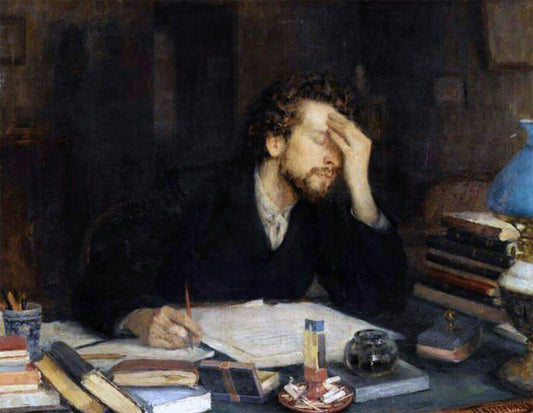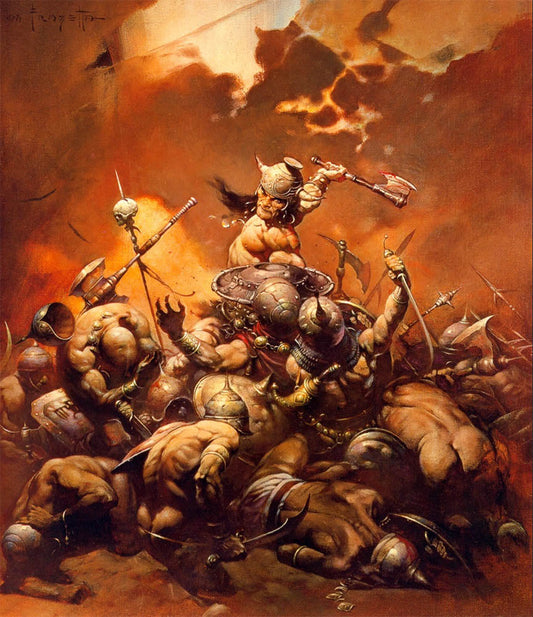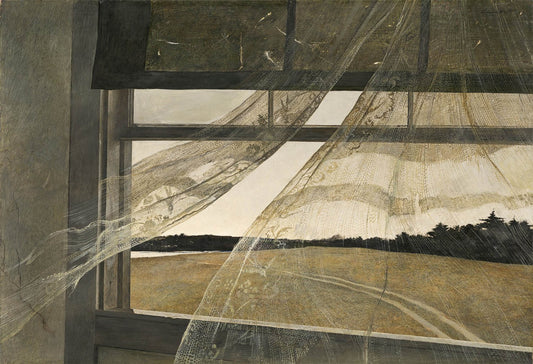Don’t Read This if You’re a Self-Taught Artist!
Andreas ClaußenShare
WARNING: DANGER
Self-taught artists, beware! You might accidentally learn something from someone else and lose your hard-earned "self-taughtness."

Time and time again, I come across the term “self-taught” artist. Every time I see it, it makes me pause, so I decided to take a closer look. Why is this label so prevalent, and is it really helpful for artists to use it?
The "Self-Taught" Aura
The label “self-taught” seems to carry a certain mystique. It’s used by those with impressive artistic abilities, as well as those who may doubt whether they’re truly artists. It’s almost like a brand—something special that deserves recognition. It suggests freedom, autonomy, and independence. And who doesn’t love the idea of being completely independent? Who wants to admit they needed help?

It’s also undeniably cool to teach yourself something. Imagine sitting in an empty, windowless room with just a chair, a table, and an unknown object, “X.” You’ve heard of X, but you’ve never really dealt with it. You don’t know how it works, but you dive in, explore it, and eventually understand its functions, behaviors, limitations, and possibilities—all without any outside help. Impressive, right?
And then, after all that effort, you type:
“I am a self-taught artist. Look at what I’ve done.”
(Roaring applause from somewhere in the distance.)
Defining "Self-Taught"
When we search for a definition of a self-taught artist or an autodidact, we usually find something like this:
A self-taught person is someone who has acquired knowledge without the guidance of a teacher or formal lessons.
So, the key distinction for being self-taught is the absence of a teacher or formalized learning—no university, no school, no study groups, no structured lessons. Essentially, someone is self-taught if they haven’t been trained by others or participated in traditional education.
This definition gives us a rough idea of what we expect from a self-taught person:
Someone who taught themselves.
Full stop.

Where Do We Find Autodidacts?
It’s interesting to note that in some fields, the term “self-taught” is almost nonexistent. You never hear of a self-taught judge or neurosurgeon, do you? This is because certain professions demand a high degree of professionalism, knowledge, and skill, especially in areas where human lives are at stake. Regulations are in place to ensure that doctors and officials are well-trained to minimize risks.

On the other hand, you often find self-taught individuals in fields with less stringent educational requirements—politics, journalism, art, and so on.
Interestingly, many researchers and developers in fields like biology, law, mathematics, or art, are self-taught in specific areas. They venture into uncharted territory, where no one has studied before. Here, knowledge is discovered through trial and error, and only then can it be taught.

Why It’s Impractical to Reinvent the Wheel
Our ancestors and peers have accumulated a vast body of knowledge that serves as a springboard for us to learn new skills. This knowledge is readily available; we don’t need to start from scratch.
For instance, we learn to communicate using existing grammar, words, and characters. We don’t have to invent a new language because the one we have works perfectly well. It would be neither efficient nor effective if everyone had their own language. If we did, communication—the very purpose of language—would become nearly impossible.
Therefore, trying to learn something entirely on your own without using available resources is impractical. It makes far more sense to build on the existing knowledge in your field of interest, question it, and then develop it further. There’s no need to reinvent the wheel every time.

Why We’re All Self-Taught (Sort of)
Most people who call themselves “self-taught” probably don’t even consider the full implications of the term. They likely don’t mean they’re 100% self-taught. After all, anyone who taught themselves to paint didn’t do so without ever seeing, reading, or hearing about painting. (How else would they know that paint and brushes are involved?)
I believe the term is often used to distinguish those who haven’t followed a traditional learning path (mentors, studios, universities, etc.).
However, this reflects a misunderstanding of the learning process. Simply watching or listening to others provides information, but it doesn’t automatically lead to learning or skill development.
No one gets fit just by watching someone else lift weights. Similarly, you can’t learn to paint just by peering over a master’s shoulder. You can learn something about the process, but not how to do it yourself. Learning requires doing.

What differs is how we obtain information. Those who choose traditional education gain access to certain resources (libraries, teachers, classmates) and reduce the logistical burden (schedules, workspaces, materials) at the beginning of their journey.
While these resources can be replicated online through books and videos, neither formal education nor self-study alone makes you a better artist. What truly matters is the time you invest and the work you put in.
In this sense, we’re all self-taught—to varying degrees.

Why It Doesn’t Matter Whether You’re Self-Taught or Not
In the art world, I rarely see truly professional artists using the term "self-taught," but I often see beginners doing so. If this observation is statistically accurate, it’s worth considering why. Why don’t professionals emphasize their education, while beginners often tout it as a unique selling point?
Perhaps beginners feel they lack something that professionals have: something remarkable.
A professional artist doesn’t need to mention the prestigious university they attended or the excellent grades they received years ago. They don’t need to highlight that they acquired most of their skills independently. Instead, they can simply show their work and explain what’s remarkable about it—be it the quality of execution, the materials used, the subject matter, the context, or the unique perspective they offer.
Most people aren’t interested in the artist’s educational background; they care about the work itself.
And that’s what really counts.
So, don’t label yourself as “self-taught”—we all are, to some extent. Instead, focus on what makes you remarkable.
A Few Small Requests
-
If you consider yourself a self-taught artist and have a remarkable story about your learning process, please share it. We can all learn from your experience.
-
If you’re a self-taught artist who has gained valuable knowledge, consider teaching others. We need every good teacher we can get.



